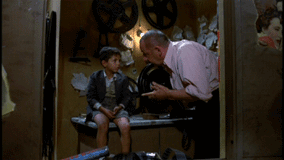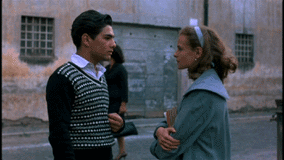|
Newest Reviews:
New Movies -
The Tunnel
V/H/S
The Tall Man
Mama Africa
Detention
Brake
Ted
Tomboy
Brownian Movement
Last Ride
[Rec]³: Genesis
Hara-Kiri: Death of a Samurai
Indie Game: The Movie
Abraham Lincoln: Vampire Hunter
Old Movies -
Touki Bouki: The Journey of the Hyena
Drums Along the Mohawk
The Chase
The Heiress
Show
People
The Strange Affair of Uncle Harry
Pitfall
Driftwood
Miracle Mile
The Great Flamarion
Dark Habits
Archives -
Recap: 2000,
2001, 2002,
2003, 2004
, 2005, 2006,
2007 , 2008
, 2009 ,
2010 , 2011 ,
2012
All reviews alphabetically
All reviews by star rating
All reviews by release year
Masterpieces
Screening Log
Links
FAQ
E-mail me
HOME
| |
Cinema Paradiso (Giuseppe Tornatore) 1988
 I’m fully aware that Giuseppe Tornatore’s Italian tearjerker Cinema
Paradiso is beloved by many, but I can’t drum up much goodwill for it.
Telling the story of a young boy’s relationship to a projectionist and, more
importantly, to popular film, it never is afraid to simplify itself further so
that no one watching feels left out of its banality. When the young boy’s
mentor tells him not to give into nostalgia, the sentiment feels laughable
considering this film’s reverence to all things wistful. There are
never-ending emotional climaxes here, but the film drags on despite the fact
that things keep happening quickly. Thanks to a glaring plot hole, the film’s
one inspired moment, the ending montage, relies on the audience’s inability to
remember a fire that takes place midway through the picture, but plot holes are
the least of this shallow and unbelievably corny movie’s problems.
I’m fully aware that Giuseppe Tornatore’s Italian tearjerker Cinema
Paradiso is beloved by many, but I can’t drum up much goodwill for it.
Telling the story of a young boy’s relationship to a projectionist and, more
importantly, to popular film, it never is afraid to simplify itself further so
that no one watching feels left out of its banality. When the young boy’s
mentor tells him not to give into nostalgia, the sentiment feels laughable
considering this film’s reverence to all things wistful. There are
never-ending emotional climaxes here, but the film drags on despite the fact
that things keep happening quickly. Thanks to a glaring plot hole, the film’s
one inspired moment, the ending montage, relies on the audience’s inability to
remember a fire that takes place midway through the picture, but plot holes are
the least of this shallow and unbelievably corny movie’s problems.
 The movie is hopelessly manipulative. No emotion remains
unnoted by Ennio Morricone’s ever-present score. There’s never any doubt
about what we’re supposed to think during a scene, and that emotional
simplicity seems a cheat. I have apprehensive, conflicted feelings about most of
my favorite films, because they provoke thoughts and feelings in me that I might
not have otherwise had, and because they change as I mature between my viewings
of them. This film would have you thinking that everyone who ever watched any
film would have the exact same reaction, and its own workmanlike construction
seems to place its bets on that shoddy theory. I couldn’t imagine any complex
reaction coming from a pretty, but facile, film such as this. Worst of all, much
of the second act is dominated not by love of cinema, but by a case of teenage
puppy love (presumably inserted with the intention of creating more classic love
scenes), and that apparent lack of faith in the subject matter undermines the
whole affair. How are we to believe in the power of the movies when this one
can’t even hold our attention by celebrating them? The underdeveloped people
in this town are a bunch of churlish and saucer-eyed dopes, especially when
compared to the cast of a more vivid reminiscence like Fellini’s Amarcord.
It’s as if the movie is set in a parallel universe without cynics, since the
only person that dislikes the crowd-pleasers is an insane vagrant. If all movies
were so capable of homogeneous acclaim, I doubt they’d be capable of
intriguing me as they have. Many of the sequences, like the one in which two
theaters are forced to share a film, rotating reels by courier, don’t have any
real payoff. Perhaps, the truncated nature of the original American release is
to blame. A longer, director’s cut of Cinema Paradiso is slated for
domestic release later this year (and currently available on foreign DVD), and
will hopefully stifle many of these complaints.
The movie is hopelessly manipulative. No emotion remains
unnoted by Ennio Morricone’s ever-present score. There’s never any doubt
about what we’re supposed to think during a scene, and that emotional
simplicity seems a cheat. I have apprehensive, conflicted feelings about most of
my favorite films, because they provoke thoughts and feelings in me that I might
not have otherwise had, and because they change as I mature between my viewings
of them. This film would have you thinking that everyone who ever watched any
film would have the exact same reaction, and its own workmanlike construction
seems to place its bets on that shoddy theory. I couldn’t imagine any complex
reaction coming from a pretty, but facile, film such as this. Worst of all, much
of the second act is dominated not by love of cinema, but by a case of teenage
puppy love (presumably inserted with the intention of creating more classic love
scenes), and that apparent lack of faith in the subject matter undermines the
whole affair. How are we to believe in the power of the movies when this one
can’t even hold our attention by celebrating them? The underdeveloped people
in this town are a bunch of churlish and saucer-eyed dopes, especially when
compared to the cast of a more vivid reminiscence like Fellini’s Amarcord.
It’s as if the movie is set in a parallel universe without cynics, since the
only person that dislikes the crowd-pleasers is an insane vagrant. If all movies
were so capable of homogeneous acclaim, I doubt they’d be capable of
intriguing me as they have. Many of the sequences, like the one in which two
theaters are forced to share a film, rotating reels by courier, don’t have any
real payoff. Perhaps, the truncated nature of the original American release is
to blame. A longer, director’s cut of Cinema Paradiso is slated for
domestic release later this year (and currently available on foreign DVD), and
will hopefully stifle many of these complaints.
*
05-01-02
Jeremy Heilman
|